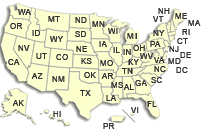Guidelines for the processing and quality assurance of benthic invertebrate samples collected as part of the National Water-Quality Assessment Program
Open-File Report 93-407
By T.F. Cuffney, M.E. Gurtz, and M.R. Meador
Superseded by OFR 00-212
Abstract
Benthic invertebrate samples are collected as part of the U.S. Geological Survey's National Water-Quality Assessment Program. This is a perennial, multidisciplinary program that integrates biological, physical, and chemical indicators of water quality to evaluate status and trends and to develop an understanding of the factors controlling observed water quality. The Program examines water quality in 60 study units (coupled ground- and surface-water systems) that encompass most of the conterminous United States and parts of Alaska and Hawaii.
Study-unit teams collect and process qualitative and semi-quantitative invertebrate samples according to standardized procedures. These samples are processed (elutriated and subsampled) in the field to produce as many as four sample components: large-rare, main-body, elutriate, and split. Each sample component is preserved in 10-percent formalin, and two components, large-rare and main-body, are sent to contract laboratories for further processing. The large-rare component is composed of large invertebrates that are removed from the sample matrix during field processing and placed in one or more containers. The main-body sample component consists of the remaining sample materials (sediment, detritus, and invertebrates) and is subsampled in the field to achieve a volume of 750 milliliters or less. The remaining two sample components, elutriate and split, are used for quality-assurance and quality-control purposes.
Contract laboratories are used to identify and quantify invertebrates from the large-rare and main-body sample components according to the procedures and guidelines specified within this document. These guidelines allow the use of subsampling techniques to reduce the volume of sample material processed and to facilitate identifications. These processing procedures and techniques may be modified if the modifications provide equal or greater levels of accuracy and precision. The intent of sample processing is to determine the quantity of each taxon present in the semi-quantitative samples or to list the taxa present in qualitative samples. The processing guidelines provide standardized laboratory forms, sample labels, detailed sample processing flow charts, standardized format for electronic data, quality-assurance procedures and checks, sample tracking standards, and target levels for taxonomic determinations. The contract laboratory (1) is responsible for identifications and quantifications, (2) constructs reference collections, (3) provides data in hard copy and electronic forms, (4) follows specified quality-assurance and quality-control procedures, and (5) returns all processed and unprocessed portions of the samples.
The U.S. Geological Survey's Quality Management Group maintains a Biological Quality-Assurance Unit, located at the National Water-Quality Laboratory, Arvada, Colorado, to oversee the use of contract laboratories and ensure the quality of data obtained from these laboratories according to the guidelines established in this document. This unit establishes contract specifications, reviews contractor performance (timeliness, accuracy, and consistency), enters data into the National Water Information System-II data base, maintains in-house reference collections, deposits voucher specimens in outside museums, and interacts with taxonomic experts within and outside the U.S. Geological Survey. This unit also modifies the existing sample processing and quality-assurance guidelines, establishes criteria and testing procedures for qualifying potential contract laboratories, identifies qualified taxonomic experts, and establishes voucher collections.
Citation:
Cuffney, T.F., Gurtz, M.E., and Meador, M.R., 1993, Guidelines for the processing and quality assurance of benthic invertebrate samples collected as part of the National Water-Quality Assessment Program: U.S. Geological Survey Open-File Report 93-407, 80 p.
|
For more information, contact |
To order printed copies, contact |
North Carolina Water Science Center
U.S. Geological Survey
3916 Sunset Ridge Road
Raleigh, North Carolina 27607
(919) 571-4000
E-mail
|
North Carolina Water Science Center
U.S. Geological Survey
3916 Sunset Ridge Road
Raleigh, North Carolina 27607
(919) 571-4037
E-mail
|
U.S. Geological Survey
Information Services
Box 25286, Federal Center
Denver, CO 80225
1-888-ASK USGS
|
|
